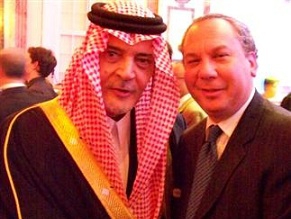|
World Jewish News

Saudi Foreign Minister Prince Saud al-Faisal with Rabbi Marc Schneier, President of the Foundation for Ethnic Understanding and Vice President of the World Jewish Congress, at the Vienna interfaith gathering.
|
Muslim, Christian and Jewish leaders meet in Vienna, commit to promote interfaith dialogue and tolerance
29.11.2012, Jews and Society «Dialogue between religions is as necessary as ever in light of recent conflicts » said UN Secretary General Ban Ki-moon Monday at a meeting Monday in Vienna of Muslim, Jewish and Christian leaders aimed at forging new efforts promoting interfaith dialogue and tolerance.
The meeting came on the occasion of the opening of the King Abdullah Bin Abdulaziz International Centre for Interreligious and Intercultural Dialogue, (KAICIID), a project made possible by a gift of the Saudi royal family.
The KAICIID was set up jointly by Saudi Arabia, Spain and Austria, with the Vatican acting as "founding observer."
The interfaith meeting was held just days after fighting between Hamas and Israel stopped in the aftermath of an Egyptian-brokered ceasefire.
Among Jewish personalities who took part in the opening ceremony at Vienna's Hofburg palace were Rabbi Marc Schneier, Founder and President of the Foundation for Ethnic Understanding and Vice President of the World Jewish Congress (WJC), Rabbi David Rosen, director of interreligious affairs at the American Jewish Committee, Chief Rabbi of Moscow Pinchas Goldschmidt, who also serves as president of the Conference of European Rabbis, Rabbi Arthur Schneier, president of the Appeal of Conscience Foundation and Professor Lawrence Schiffman, Chairman of the International Jewish Committee on Interfaith Consultations (IJCIC).
The Foreign Ministers of Saudi Arabia, Spain and Austria were also present as well as Vienna's Hofburg palace
"We need look no further than today's headlines to understand why this mission is so vital," Ban Ki-moon told the gathering, citing the recent conflicts and religious divisions in Syria, Israel and Mali.
"Too many religious leaders have stoked intolerance, supported extremism and propagated hate... Yet we know that blaming 'the other' is not a political strategy for a healthy country, continent or world."
"Religious leaders have immense influence. They can be powerful forces for cooperation and learning. They can set an example of interfaith dialogue," the secretary general urged.
The UN chief also used his address to express his hope that the ceasefire between Israel and Gaza holds but said that understanding and dialogue between peoples of all faiths was essential to resolving ethnic strife across the globe.
Rabbi Schneier says that despite the recent hostilities in Gaza, religious leaders recognize that the conflict doesn’t represent ties between Muslims and Jews.
“While we all looked on with deep concern at the recent events, we know that the strong bonds that exist between our religions will not be defined by violence,” he said.
“Our goal is to ensure that the vast majority of the Muslim world, which practices peaceful interaction with peoples of all faiths, will continue to be our partners in promoting greater tolerance and dialogue across the international community.”
“There is no denying that contemporary Europe faces many challenges when it comes to practicing tolerance between ethnic communities, Rabbi Schneier said. “But we firmly believe that being proactive in educating the public about the realities of peoples of other faiths is the most important way to promote dialogue and foster greater co-existence.”
In recent weeks, the Foundation for Ethnic Understanding, led by Rabbi Schneier, has brought together dozens of Muslim and Jewish communities in North America and Europe through their Weekend in Twinning Program.
The program brings imams into synagogues and rabbis into mosques to encourage co-existence initiatives and highlight how the many commonalities that exist between the two faiths.
EJP
|
|
